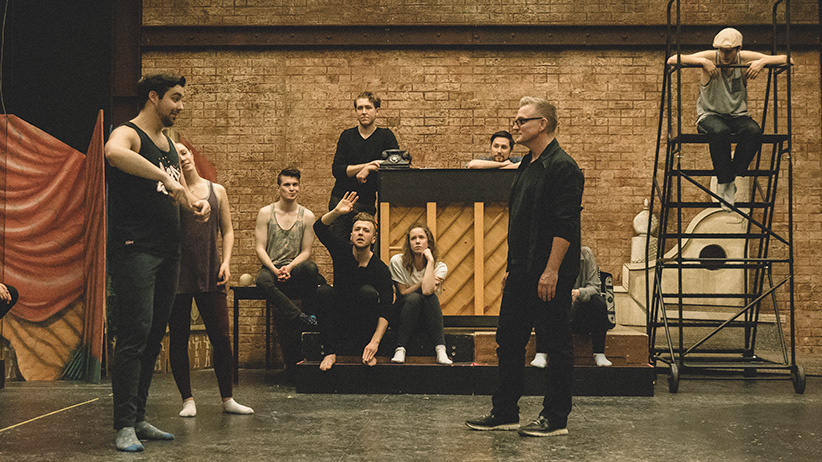3M Teaching Fellow: Sheridan College’s Marc Richard
Schools can provide the tools and space for learning, but students need to take ownership of their education, according to this music theatre instructor.
Marc Richard leads his class during an afternoon rehersal at Sheridan College in Oakville, Ontario. Richard has been awarded the prestigous 3M National Teaching Fellowship. (Photograph by Jalani Morgan)
Share

Marc Richard started his career as a kindergarten teacher. In that role, he developed a teaching philosophy that’s defined his entire career, right up to his current role coordinating the bachelor of music theatre performance program at Sheridan College.
“My passion for teaching is all about helping students discover something for themselves so that they own it,” Richard says. “We can’t give knowledge to them—we have to let them discover things for themselves.” The teacher and the school can provide the framework, he says, but the students take responsibility for “the process of discovery, of making sense for themselves.”
This approach sometimes reverses the traditional teacher-student hierarchy. “We are all learning together in a relationship, negotiating our curriculum,” Richard says.
Richard’s pupils appreciate how he approaches the class as a student himself. “He inspires learning in those around him, because he himself is also inspired to learn,” says Jonathan Corkal, one of Richard’s students. “One of the things he really stresses is that the most powerful tool is the ability to teach each other. That’s the environment he creates in his classes and in his relationships with his students and the faculty around him.”
Richard’s approach to arts education is clearly passionate, but he also doesn’t romanticize. “Learning is not always fun,” he says. Some of the time, it can be enjoyable. But if you’re learning something big and intense and complicated, it can hurt.
“I think it’s important that we are there with a safety net to catch the students during the parts of the process that don’t feel good.”
As befits a music theatre instructor—and creative dance researcher—Richard puts a great deal of emphasis on the role of the body in his students’ learning.
“This is something we too often lose now in our schools and in our adult lives, and it is so important when we are able to bring it back,” he says.
It’s easy to spot how Richard’s approach benefits his students, according to Michael Rubinoff, Sheridan’s associate dean of visual and performing arts. “You can identify the work Marc has done with each student on an individual basis. You can see their risk-taking, creativity, critical thinking and accomplishment.”
Richard also works to ensure his students’ learning experience includes practical internship opportunities as well as partnerships with music theatre organizations, other academic institutions and grassroots arts groups.
“Our students will eventually be the artistic directors at major festivals, leaders in arts or other businesses,” he says. “They need to know how to grow [and] change the business. As they do this, they need to continue to grow and challenge themselves. Learning is a lifelong process, and we must prepare our students for this process.”
MORE ABOUT TEACHING:
- A teacher to her students: ‘What I need you to know is that I value you’
- 2016 teaching awards: These professors are at the head of the class
- What is the best way to teach math?
- Striking B.C. teachers must mark exams
- Political science profs skip teaching lesson
- Anger as U of T drops Bachelor of Education
- Boost productivity by asking professors to teach more: report
- 3M Fellow Pippa Lock sees teaching as a calling